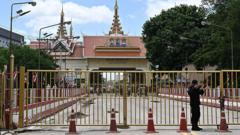Geert Wilders’ far-right Freedom Party withdrawal leads to the collapse of the Dutch government, with implications for future elections and asylum policies.
**Political Turmoil in the Netherlands: Government Falls as Far-Right Leader Exits Coalition**

**Political Turmoil in the Netherlands: Government Falls as Far-Right Leader Exits Coalition**
Dutch government collapses following Geert Wilders' exit from the coalition, raising political tensions.
In a dramatic turn of events, the Dutch government has collapsed after Geert Wilders, the leader of the far-right Freedom Party (PVV), announced his withdrawal from the governing coalition less than one year after its establishment. Prime Minister Dick Schoof confirmed his resignation on Tuesday, planning to submit the cabinet's resignation to King Willem-Alexander by day’s end. Schoof expressed dismay over Wilders' actions, labeling them as "irresponsible and unnecessary."
Wilders, who has expressed aspirations to lead the Netherlands, indicated his intention to capitalize on his party's popularity in the upcoming elections following his departure from the coalition. With an important NATO summit set to convene in The Hague soon, it is anticipated that Schoof's cabinet will operate in a caretaker capacity until new elections are scheduled.
The conflict commenced when Wilders tabled demands for ten new asylum measures, including a freeze on asylum applications and restrictions on family reunifications. His withdrawal shocked and outraged fellow coalition members, who highlighted that some of his demands were already covered in the existing coalition agreement. Many of Wilders' additional asylum proposals had previously been dismissed during negotiations due to legal complications.
This abrupt exit has frayed the coalition, initially formed in July 2024 after extensive political negotiations post-elections, and which included parties such as the conservative VVD and the Farmers' Citizen Movement (BBB). Former coalition partners accused Wilders of intentionally creating the crisis, pointing out that his motivations extended beyond the asylum issues at hand.
Economic analysts downplayed immediate financial repercussions from the government's collapse, noting that the cabinet had been largely inactive during its 11-month tenure. Media reactions reflect disappointment, with critiques of alleged incompetence within the administration. Political analysts also speculate that Wilders’ gamble of prioritizing asylum in his upcoming campaign may not yield the desired results, considering his party’s previous control over immigration policy.
With the political landscape shifting dramatically, the Netherlands faces uncertainty, and citizens await the government’s next steps amid a backdrop of rising tensions and calls for political accountability.
Wilders, who has expressed aspirations to lead the Netherlands, indicated his intention to capitalize on his party's popularity in the upcoming elections following his departure from the coalition. With an important NATO summit set to convene in The Hague soon, it is anticipated that Schoof's cabinet will operate in a caretaker capacity until new elections are scheduled.
The conflict commenced when Wilders tabled demands for ten new asylum measures, including a freeze on asylum applications and restrictions on family reunifications. His withdrawal shocked and outraged fellow coalition members, who highlighted that some of his demands were already covered in the existing coalition agreement. Many of Wilders' additional asylum proposals had previously been dismissed during negotiations due to legal complications.
This abrupt exit has frayed the coalition, initially formed in July 2024 after extensive political negotiations post-elections, and which included parties such as the conservative VVD and the Farmers' Citizen Movement (BBB). Former coalition partners accused Wilders of intentionally creating the crisis, pointing out that his motivations extended beyond the asylum issues at hand.
Economic analysts downplayed immediate financial repercussions from the government's collapse, noting that the cabinet had been largely inactive during its 11-month tenure. Media reactions reflect disappointment, with critiques of alleged incompetence within the administration. Political analysts also speculate that Wilders’ gamble of prioritizing asylum in his upcoming campaign may not yield the desired results, considering his party’s previous control over immigration policy.
With the political landscape shifting dramatically, the Netherlands faces uncertainty, and citizens await the government’s next steps amid a backdrop of rising tensions and calls for political accountability.





















